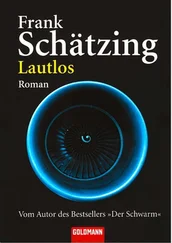A moment later everything was back – the viewing terrace, the slope of the Isla de las Estrellas, the floating platform in the sea. Julian Orley, with waving ponytail and sparkling eyes, stretched his arms to the sky as if to receive the eleventh Commandment.
‘Twenty years ago, when Orley Enterprises began thinking about the construction of space elevators, I promised the world that I would build it an elevator into the future. Into a future that our parents and grandparents would never have dared to dream of. The best future we have ever had. And we have built it! In a few days you will travel on it to the OSS. You will see the Earth as a whole, our unique and wonderful home – and you will be amazed as you turn your gaze to the stars, to our home of tomorrow.’
To dramatic background music, on columns of red light, two shimmering cabins rose from the cylindrical station building on the sea platform and shot up into the sky. Julian threw back his head and gazed after them.
‘Welcome,’ he said, ‘to the future.’
Not again, thought Gerald Palstein. Not the same accusation, the same question, for the fourth time.
‘Perhaps it would have been cleverer, Mr Palstein, to keep on the people you are now throwing out of their workplaces and keep them otherwise engaged instead of digging up the last intact ecosystems on Earth in an obsessive quest for oil. Wasn’t it a grave mistake by your department to install the facility in the first place, as if energy sources like helium-3 and solar power were an irrelevance?’
Suspicion, incomprehension, malice. The press conference that EMCO was holding to bury the Alaska project had assumed the character of a tribunal, with him as whipping boy. Palstein tried not to let his exhaustion show.
‘From the perspective of the time, we acted completely responsibly,’ he said. ‘In 2015, helium-3 was a crazy dream. The United States of America couldn’t base their energy policy purely on the off-chance of a technological stroke of genius—’
‘In which you now want to participate,’ the journalist interrupted. ‘A bit late, don’t you think?’
‘Of course, but perhaps I could refer you to a few things I thought were familiar to both of us. On the one hand I wasn’t yet presiding over the strategy sector of EMCO in 2015—’
‘But you were its deputy manager.’
‘The final decision for what was to be built was my predecessor’s responsibility. But you’re right. I supported the Alaska project because there was no way of telling whether either the space elevator or fusion technology would work as predicted. So the project was clearly in the interest of the American nation.’
‘Or in the interest of a few profiteers.’
‘Let’s reconsider the situation. At the start of the millennium our energy policy was aimed at freeing us from dependency on the Middle East. Particularly since we were forced to accept that the one who decides to fight a war doesn’t necessarily win the peace. Going into Iraq was madness. The American market couldn’t profit from it nearly as much as we had hoped. We had planned to send our people down there and take over the oil business; instead we saw American soldiers coming back in coffins week after week, so we hesitated until other people had divided up the cake between themselves. Except that after even conservative Republicans had reached the conclusion that George W. Bush had been a hugely dangerous fool, who had ruined both our economy and our standing in the world, no one really felt like marching into Iran carrying guns.’
‘Do you mean you regret that the option of another war was off the cards?’
‘Of course not.’ Incredible! The woman just wasn’t listening. ‘I was always vehemently opposed to war, and still am today. You just have to understand what a jam the United States was in. Asia’s hunger for raw materials, Russia’s gamble on resources, our disappointing performance in the Middle East, one great big disaster. Then 2015, the uprising in Saudi Arabia. The Stars and Stripes burning in the streets of Riyadh, the whole folklore of the Islamist seizure of power, except that we couldn’t just throw those guys out because China had lent them money and arms. An official military intervention in Saudi Arabia would have amounted to a declaration of war on Beijing. You know yourself how things look down there now. Nobody might be interested in it today, but in those days it would have been reckless to depend entirely on Arab oil. We had to take alternatives into consideration. One of those lay in the sea, the other in the exploitation of oil sand and shale, the third in the resources of Alaska.’
Another journalist put her hand up. Loreena Keowa, environmental activist with native American roots, and reporter-in-chief for Greenwatch. Her reports were hugely popular on the net. She was critical, but Palstein knew that under certain circumstances he could see her as an ally.
‘I don’t think anyone can blame a company for declaring a corpse to be dead,’ she said. ‘Even if it means a loss of jobs. I just wonder what EMCO has to offer the people who are now losing their workplaces. Perhaps there’s no point crying over spilt milk, but didn’t the refusal of ExxonMobil to invest in alternative energies lead to their present disastrous situation?’
‘That is correct.’
‘I remember Shell pointing out twenty years ago that it was an energy company and not an oil company, while ExxonMobil insisted that it didn’t need a foothold in the alternative energies. The end of the oil age, which many saw on the horizon, was, literally, a widespread misunderstanding .’
‘That assessment was clearly incorrect.’
‘And we are feeling the after-effects all the more painfully for that. Perhaps it’s true that no one could have predicted a turnaround in the energy market on the present scale. What is clear is that EMCO isn’t in a position to employ its people in alternative fields, because there are no alternative fields.’
‘That’s exactly what we want to change,’ said Palstein patiently.
‘I know you want to change it, Gerald.’ Keowa grinned crookedly. ‘But your critics see your planned involvement in Orley Enterprises as smoke and mirrors.’
‘Incorrect.’ Palstein smiled back. ‘You see, I don’t want to make excuses for anything, but in 2005 I was responsible for drilling projects in Ecuador for Conoco-Phillips, and only switched to strategic management in 2009. At that time the American oil and gas business was dominated by ExxonMobil. Prognoses about alternative energies were pretty much divided on either side of the Atlantic. ExxonMobil invested in the Arabian Gulf and tried to take over Russian oil companies, backed high growth-rates as the result of rising oil prices and disregarded things like ethics and sustainability. In Europe it looked quite different. By the end of the nineties Royal Dutch Shell had created a new commercial division for renewable energies. BP had been a bit shrewder, in opening up deep-sea projects and becoming involved in Russian projects, while at the same time using slogans like “Beyond Petroleum” and diversifying their commercial areas wherever they could.’
Palstein knew that the younger journalists in particular were short of information. He outlined how the process of consolidation had peaked immediately before the seizure of power by the Saudi Islamists, when Royal Dutch Shell was absorbed into BP, producing UK Energies, while in America ExxonMobil had merged with Chevron and ConocoPhillips into EMCO.
‘In 2017 I assumed the position of deputy director within the strategic sector of EMCO. On the very first day a press release landed on my table, saying that Orley Enterprises had made a breakthrough in the development of a space elevator. I suggested entering negotiations with Julian Orley for a participation in Orley Energy. I also recommended that we purchase shares in Warren Locatelli’s Lightyears or, better still, buy the whole company. Locatelli’s market leadership in photovoltaics didn’t just come out of the blue; he would still have been open to negotiation in 2015.’
Читать дальше












